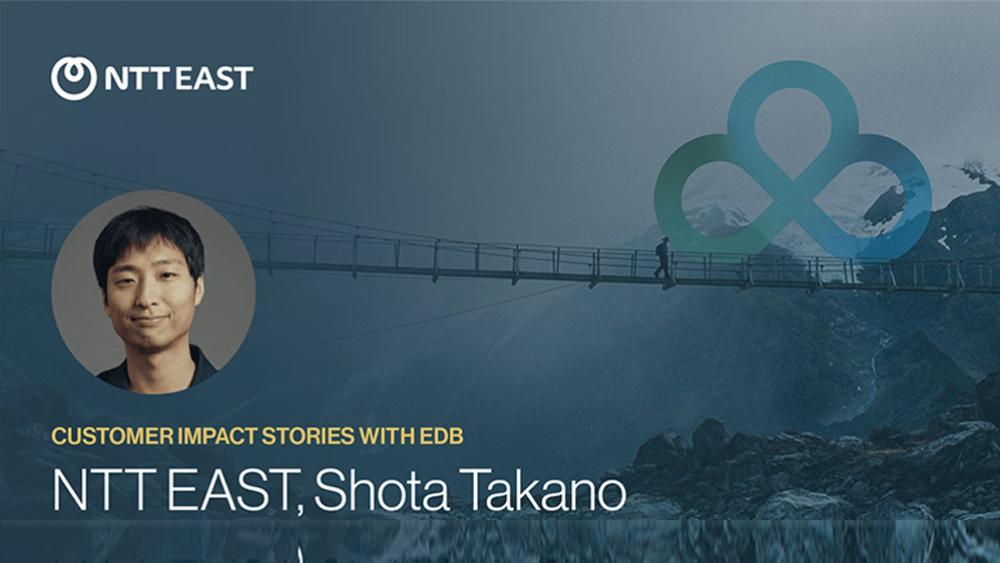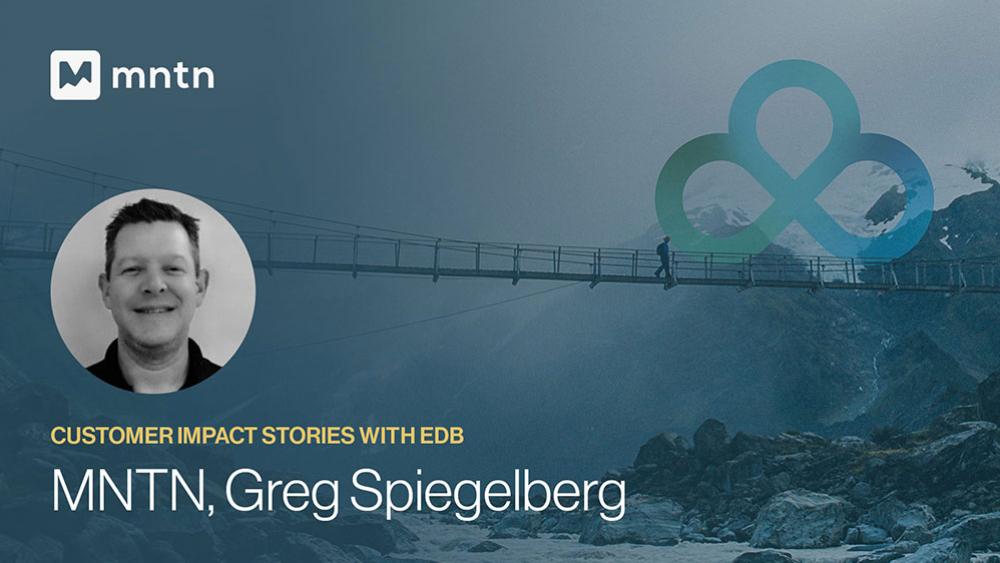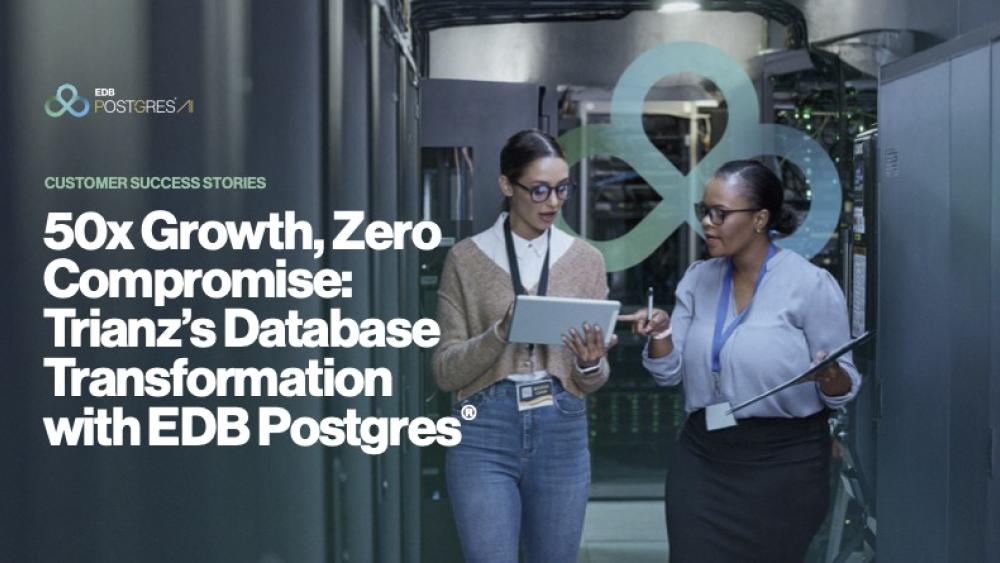areeba Accelerates Time-to-Market and Innovation with Postgres and EDB
Key Takeaways
- Ensured an always-on payment processing platform (using an automatic failover architecture) that maintains strict ACID-compliant, transactional consistency
- Achieved aggressive time-to-market timelines through an accelerated development cycle, despite the team's inexperience working with Postgres
- By employing EDB's enterprise tools for Postgres, areeba conserved capital to redeploy toward innovation and future needs
- By choosing Postgres and EDB, areeba achieved immediate results and simultaneously implemented critical building blocks for their future automation plans; their future automation is to be delivered through exciting Cloud Native technology that will further ensure easy deployment, scaling, and performance.
Products
- Postgres Enterprise Manager (PEM)
- EDB Failover Manager (EFM)
- Planned: Cloud Native Postgres
- Planned: EDB Postgres Distributed
Industry
- Financial Services: Electronic Payments Processor
About areeba
areeba is a regional e-payments technology company providing solutions in both the physical and digital spaces. The fintech is renowned for its modern, highly secure, and high-performance systems that customers can rely on for seamless payments, speed to market, easy integration, and advanced payment solutions.
areeba’s extraordinary experience, together with unrivaled infrastructure and operational excellence, enables them to offer Banks, Fintechs, Merchants and Governments a unique range of payment services, tailored to their every need: from issuer processing and merchant acquiring to digital payments.
Through its market-leading platform and partnerships with global leaders like Mastercard and Visa, areeba is helping to transform the Middle East’s relationship with digital payments.
Challenge
Launched in 2017, areeba seeks to simplify daily financial dealings with the ultimate purpose of reconciling people with fiscal issues by providing innovative solutions to shift payments to a digital and cashless ecosystem.
At the time, digital payments were relatively rare in the region, and global financial services organizations were paying little attention—or investment—to developing the infrastructure or supporting the nascent community interested in adopting digital payments.
However, globally, e-payment trends were rapidly evolving in the payment and transaction industry. Aiming to take advantage of this exciting shift, M1 Group, a regional investment holding, acquired Bank Audi’s Electronic Payment and Card Services Department (EPCS) and turned it into areeba, a fintech regulated by the Central Bank of Lebanon, as well as by Mastercard, Visa and American Express.
When areeba was launched as an independent entity, a lot of investment was made into technology platforms, especially given the fact that since its creation, areeba’s structure still relied on outsourced services for nearly everything—infrastructure, card management, point of sale, data and analytics, and more. Such reliance on outsourced services was both cost-prohibitive and limiting to developing new services and approaches to digital payments.
“Since inception, our goal was to transform into a service-oriented company with a startup mindset,” remembers Elie Soukayem, chief technology officer at areeba. “Our operations costs were really high and our speed to market was limited. We had a huge transformation ahead of us—related to architecture, costs, and infrastructure - basically every aspect of the business needed to be reconceived to make areeba competitively viable.”
Today, the company provides a wide variety of solutions, including the ability for banks and fintechs to offer their customers a broad range of payment solutions that would meet the local and regional requirements, in addition to a variety of digital payment solutions for merchants and governments seeking to adapt to new customer engagement methods.
In a market that includes both conventional financial services institutions and global fintech companies, areeba faces fierce competition as it seeks to establish itself as the de facto solution for cashless payments in the Middle East. Focused on two critical solution areas (making payments and accepting payments), areeba sought a flexible database that could handle rapid innovation without sacrificing the strict ACID compliance and performance that real-time financial transactions require.
Solution
“Back in 2017, when areeba was first spun out, the region wasn’t completely digitally mature, but we knew we had to prepare ourselves for a highly competitive environment,” explains Soukayem. “That assumption has become a reality. Today, we’re seeing an attack on the region by global companies and big payment vendors. In order to compete and provide competitive services, we need to move really fast.”
In its previous, partner-reliant model, areeba was dependent on its partners to provide the services it needed to enable any new feature or innovation it conceived. As the team sought to transform the company into a highly agile technology innovator, they knew that the database foundation would be a lynchpin to a successful transformation.
Georges Abou Zeidan, areeba’s infrastructure manager, says:
“The core business is dependent on the card management system. But in order to implement our full vision, we needed that critical foundation.”
A scalable database to meet areeba’s high workload demands
Given the financial nature of the transactions captured by areeba, it was imperative to identify a highly available, redundant database with automatic failover and ACID compliance. The team had more familiarity with other major offerings, but had particular concerns about whether they would get the support and attention from a commercial database vendor that they expected to need as they innovated rapidly. In addition, the high licensing costs that many of those alternatives presented proved a big barrier to overcome.
“It wasn’t just about cost and functionality,” Abou Zeidan continues. “We wanted our technology foundation to be based on an open architecture that was platform agnostic so we wouldn’t be tied to the restrictions a single vendor could impose. With our aggressive development plans, we knew that a community-based database would give us access to a huge wealth of experience and guidance that we can’t get with your typical commercial database. Postgres was the only database that could meet all our needs.”
Abou Zeidan and his team started first with the Community Edition, testing out its viability and fitness for areeba’s use case, as well as its technical compatibility with the rest of areeba’s current and future platform architecture and the rest of the components in areeba’s stack.
“Our team found it very easy to operate Postgres,” described Abou Zeidan. “We didn’t have to make any compromises to our preferred architecture or functionality, and we were able to migrate smoothly onto Postgres. We were frankly surprised at how easy it was.”
Turning to a trusted partner to satisfy enterprise requirements and mitigate risk
However, the team did experience one challenge—the Community Edition lacked some of the enterprise features and support that areeba needed to go into production. Since areeba works with financial transactions, high availability, redundancy, and automated failover were a must, as were the monitoring, management, and backup tools the team needed to maintain the health of the system.
That’s when they turned to the EDB team. EDB’s professional services team worked closely with areeba to implement and test the new environment. They tested high availability by failing from one node to another and observed that the application remained operational. They then failed the entire environment and confirmed that the application started up in another cluster as expected.
EDB also provides critical insight into the future of Postgres, which ensures that areeba gets a first look at what’s coming in future updates and releases, enabling them to incorporate those plans in their design and implementation decisions as the platform continues to evolve. This ensures every key component of areeba’s platform is up-to-date, strengthening security and guaranteeing that necessary updates and patches are anticipated, and don’t impact customer experience.
Results
“Within 2-3 weeks of engaging with EDB, we were live with a fully redundant application,” recalls Abou Zeidan. “We had the enterprise support we needed, and because of the professional services engagement, our team was able to go live. EDB has provided us with some very good tools around monitoring, alerts, notifications, and backups to help ensure everything would continue to run smoothly.”
Ultimately, Postgres was the obvious choice given areeba’s requirements. By incorporating Postgres into its architecture, areeba gained a flexible technology foundation that could keep pace with its time-to-market ambitions. While the extensive Postgres community proved to be invaluable to help accelerate the platform’s development, areeba also needed the enterprise tools and functionality it could only get from EDB.
Future
“What’s exciting about Postgres is that it’s such a big community,” states Abou Zeidan. “For any issue we face as we evolve our usage, we can pretty much be sure to find someone that has faced the same issues and documented potential solutions.”
A modern, containerized database to support microservices architecture
In this first phase, areeba has deployed Postgres in a typical architecture so that the team can get a baseline for performance and experience without the complications of a more sophisticated architecture. However, the areeba team has adopted a microservices-based architecture, so the next phase of development will involve the containerization of the database to match the rest of the architecture. The team will also plan to take advantage of Bi-Directional Replication and deploy a full active-active architecture.
Ready for global expansion
In addition, as the team prepares to expand further into other countries in the region, local regulations around data storage will dictate where the database is deployed and managed. The ability of Postgres to support multi-cloud and hybrid environments will be critical.
“We’re really looking to position ourselves as a technology leader, and that will require us to move much faster than a legacy player that is reliant on legacy systems,” concludes Soukayem. “Our experience with Postgres and EDB has shown us that when you work with a true partner and the open source community, you can be sure to get the right support at the right time. And that’s exactly what’s really critical for us to achieve our aggressive time-to-market objectives.”
Want to learn more? Here’s how to get started with EDB.



